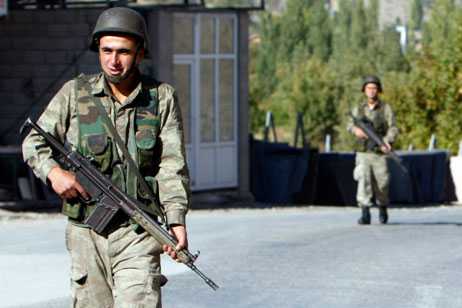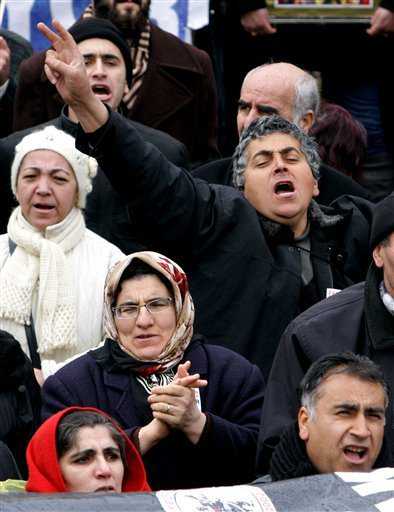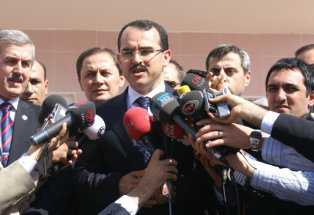ISTANBUL // A term of “patriotic duty”, as the mandatory military service for every male is called in Turkey, has been a fact of life for millions in this country for decades. A well-known saying even states that “every Turk is born a soldier”.

But this is about to change. The government in Ankara says it is working on two separate reforms that, if enacted, could decisively reduce the military’s role in many people’s lives.
One reform would give men over 30 years of age the chance to avoid military service by paying 25,000 lira (Dh51,000), while the other would allow conscientious objectors to choose non-military forms of public service for the first time in Turkish history. Women do not have to serve in the military.
Recep Tayyip Erdogan, the prime minister, said he would announce details of the plan in the coming days, with officials of his ruling party saying the announcement could come during a speech tomorrow.
The plan will apply to men who have not yet served in the military because they have been studying or have been working and living abroad.
According to news reports, men over 40 will be exempt from military service if they pay up, while candidates between 30 and 40 years of age would be required to take part in a training course for 21 days.
Under current Turkish rules, regular conscripts between the ages of 19 and 41 serve a 15-month term in the 600,000 strong military, with university graduates serving six months. About 100,000 men are expected to make use of the new law, with the state netting roughly 2.5bn lira, according to news reports.
The National Blogs
In a country where conscripts may end up in the military’s continuing fight against Kurdish rebels, the payment plan has triggered high expectations and speculation. Even though details of the new law have not been made public, private banks have said they will provide credit schemes for those who would not be able to raise the necessary money on their own.
In recent years, deadly attacks by the Kurdistan Workers’ Party (PKK), a rebel group fighting for Kurdish self-rule since 1984, triggered protests by parents of fallen conscripts who said their sons had not been adequately trained before being sent into combat. In response to those complaints, Mr Erdogan said in September that army units consisting of professional soldiers would be deployed in the border areas in the south-east, the main theatre of the fight against the PKK, after the end of their special training next spring.
Ismet Yilmaz, the defence minister, said this month that the payment scheme would be introduced to end uncertainty for men who have not yet been called up. “What do you want to do with them? Tear them away from their families, their children, their workplaces to put them into the army?” the minister asked.
But critics argue the payment scheme will only benefit the rich, while the poor will have no choice but to join the army.
Commentary: Turkey’s hard stance on Syria hides its conflicted loyalties
Last Updated:Nov 21, 2011
Ankara has all but given up on the Assad regime but may be unwilling to take further sacrifices to weaken it.
Henri Barkey
“Even now, soldiers dying in the fight against the PKK are all from poor families. The rich and the sons of high officials are not dying,” Mehmet Guner, the president of the Association of Martyrs’ Families, a group representing the relatives of soldiers killed in battle, said recently. Mr Guner said wealthy families used connections to officials in Ankara to make sure their sons would serve far from the fighting.
Under the payment scheme, that imbalance was set to get even worse, he said. “Kids from poor families will not be able to get bank credit.” Mr Guner accused the government of trying to please a minority group of relatively wealthy voters by introducing the scheme. “But one day, they will pay the bill at the ballot box.”
There have been three similar, time-limited payment schemes for military service with the last one introduced to raise state revenue after a devastating earthquake in 1999. That scheme generated reported revenues of more than 1bn lira. It is not known whether the new plan will have a time limit as well.
Meanwhile, Sadullah Ergin, the justice minister, said that new rules dealing with conscientious objectors would also be put before the cabinet by the end of next week.
The decision follows directives by the Strasbourg-based European Court of Human Rights. As a member of the Council of Europe, Turkey is obliged to follow rulings from the court that has asked Turkey to end the practice of multiple jail terms for objectors and to find a way to no longer force young men into military service. Currently, conscientious objectors are treated as deserters, with several of them in military prison.
There are about 80 conscientious objectors in the country, according to human-rights groups, but that figure could rise once it becomes easier to refuse military service.
According to news reports, the new law would allow objectors to undertake non-military duties in the army, such as kitchen or cleaning work, or serve in hospitals or other public institutions.
The alternative service is expected to be twice as long as the normal military service.
[email protected]
via Full: ‘Patriotic duty’ may no longer be mandatory for Turkey’s men – The National.
 Turkish Prime Minister Recep Erdogan has confirmed the authenticity of a tapped phone conversation which allegedly proves his involvement in judiciary affairs.
Turkish Prime Minister Recep Erdogan has confirmed the authenticity of a tapped phone conversation which allegedly proves his involvement in judiciary affairs.





